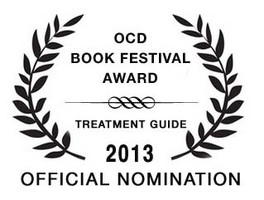
You, Your Spouse and OCD: Three’s a Crowd
By Karen J. Landsman, Ph.D., Kathleen M. Rupertus, PsyD. and Cherry Pedrick, R.N.
Originally published at beyondocd.org
The cumulative effects of OCD on a marriage can result in a relationship burdened by stress and conflict. If left alone and not shared openly, the challenges of OCD moments combined with OCD’s threats to the couple’s emotional and physical intimacy, financial stressors, interference in social relationships and activities, and fears for the future can shake the very core of your relationship.
Failure to communicate with each other openly about these stressors serves as a form of avoidance that, whether purposeful or inadvertent, creates the opportunity for the roots of the problems to grow while creating even greater opportunity for devastating and painful effects on the relationship.
Interference in Marital Roles
In many marriages, OCD can impact the distribution of household responsibilities between the two spouses. The spouse who has OCD may experience difficulties fulfilling previous household responsibilities because these responsibilities trigger obsessions and compulsions. For example, a spouse who has OCD fears of germs and contamination could have great difficulty taking the garbage cans out to the curb, cleaning the bathroom, or washing the laundry. A spouse who has fears of accidentally contaminating or poisoning others might find preparing three meals a day for the family overwhelming. Someone with fears of making a mistake could spend hours balancing the checkbook and writing out checks to pay the bills, making it easier to have the spouse take care of these chores. Consider, too, the spouse who spends long periods of time checking all the outlets before leaving the home out of fear of causing a fire. How might these OCD fears and rituals interfere with leaving the house to run errands, go food shopping, or chauffer the children to their different activities?
Oftentimes the burden of added responsibilities falls on the other spouse. With no end in sight to enduring the stress of these additional responsibilities, the other spouse may become overwhelmed, exhausted, hopeless, and even resentful over time. The daily reminders of his or her inability to fulfill previously held household responsibilities can leave the spouse who has OCD feeling weak, ashamed, and inadequate; ineffective as a partner in the relationship.
You and your spouse need to work together to fight against OCD. You can regain the former balance in your distribution of roles and responsibilities. Together you can identify problem areas, define short-term goals that support E/RP and reduce accommodating behaviors, and eventually work toward longer-term goals that will re-establish balance and decrease stress within your relationship.
Interference in Social Relationships and Activities
OCD can create obstacles to maintaining a social life and participating in activities outside of the marital relationship. Some people with OCD fear becoming “stuck” in an OCD ritual in public, revealing their dysfunction. They fear others’ judgments and the subsequent experience of shame and humiliation. In many instances, they may find it simpler to just avoid such situations and activities. Other social interactions or activities are avoided because they may require contact with an OCD trigger. A person with OCD fears of germs and contamination might find it too difficult to use a public restroom at a restaurant or amusement park. Someone with fears of accidentally harming children might find attending a child’s birthday party or baseball game too distressful.
OCD can also have a negative impact on the other spouse’s social relationships and activities. The other spouse may fear the potential for painful and misguided
judgments directed toward their loved one should OCD reveal itself to others in a social situation. Attending social activities alone due to a loved one’s avoidance not only interferes with one’s own
ability to enjoy the occasion but also serves as one more painful reminder of OCD’s unwelcome presence. The result for the couple is one less experience to share together and the threat of a growing
sense of isolation from each other.
The spouse may choose to avoid attending social events alone out of a sense of loyalty, guilt, or support for the loved one. Offering up creative excuses for declining social invitations and opportunities may become second nature for some couples. As a result, the couple may find themselves lonely and withdrawn from people who once held important places in their lives; friends and family members alike.
As you and your spouse recover from the effects of OCD, you may experience further challenges as you adjust to the changing roles and responsibilities in your relationship. For the spouse who has OCD, reestablishing balance may involve assuming previously held spousal and household responsibilities and renegotiating decision-making roles within the marriage. It may also involve adjusting to and applying a newly developed sense of independence from reliance upon others, including the supportive spouse.
As the supportive spouse, re-establishing balance might mean surrendering previously held responsibilities despite your own fears or anxieties. This may be especially true if you were significantly dependent upon for accommodations and enabling. Despite the subsequent relief you may experience in the short term, you might find that your spouse’s newly developing sense of strength and independence functions as a “threat” to your own sense of usefulness and self-worth. After all, your role in supporting your spouse through OCD helped to establish an unwritten agreement regarding roles within the marriage. Feelings such as these may be considered “normal” given the history of the relationship, but they may in turn threaten further recovery from OCD. This is especially likely when the feelings are not shared with your spouse. When feelings are left unresolved, they can inadvertently undermine your ability to be supportive of your spouse’s recovery.
As you and your spouse continue on the road to recovery, your roles will need to be re-established and re-defined over and over again. Importantly, you are on a journey with your spouse that can strengthen your connection and bring you closer in ways that feel refreshing and healthy.
Building Family Resilience
Resilience is the ability to withstand adversity, challenges, and stress. There are things you and your family can do to build resilience that will help you confront OCD and other difficulties that threaten your family. We all face adversity and challenges. Resilience prepares us ahead of time to face them.
Take Care of Your Mind
An important factor in building and maintaining resilience is the way we look at the world and interpret events. Certain thinking traps adversely affect people’s ability to respond to the challenges of life. Learning not to jump to conclusions, overlook the big picture, assume what other people are thinking, blow things out of proportion, or minimize problems helps us become more resilient. Learning to stop blaming ourselves for everything or, conversely, blaming others for our problems builds confidence, self worth, and resilience.
Challenging our own false beliefs and the negative thoughts they cause can be important factor in how we all handle daily stress. What one person considers extremely stressful may be considered only a slight challenge or perhaps even an opportunity to another person. What makes a situation stressful is our perception. It is stressful when we perceive it as a threat to our physical or psychological well-being and believe we can’t cope with the threat. Since situations and events don’t cause stress, the answer is not changing the circumstances, but changing our perceptions, our learned beliefs about them. Recognizing this will help you choose how you perceive life. You’ll be more resilient and able to handle stress.
The next time you face a stressful situation, step back and observe your negative thoughts. Are you falling into a thinking trap; blowing things out of proportion or jumping to conclusions? Can you reframe the situation as a challenge or an opportunity for growth? If you look really hard, you might even be able to find the humor in the circumstances. How often have you been able to look back and laugh about things that seemed devastating at the time? Laugh now! Laughter can decrease stress, relieve anxiety, and give us a more positive perception of life.
Summary
Everyone has problems to deal with. They can help build resilience and prepare us for the next challenge. Often, families become stronger because of shared experiences. It can break you or make you stronger. You have a choice. Make resilience and strength your choice.
It’s important to consider yourself a partner in your spouse’s battle against OCD. Joining together to fight OCD will build resiliency and strengthen trust and emotional intimacy within your marriage. Discuss with your spouse how OCD has affected your relationship through emotional and social interferences. This discussion is a step toward more effectively managing family relationships and responsibilities.
Excerpt from Loving Someone with OCD: Help for You and Your Family (2005) by Karen J. Landsman, Ph.D., Kathleen M. Rupertus, PsyD., and Cherry Pedrick, R.N. Karen J. Landsman, Ph.D., a clinical psychologist and anxiety disorders specialist, can be reached at (973) 895-2442 and practices in Millburn and Chatham, New Jersey. Kathleen M. Rupertus, PsyD. can be reached at (302) 388-7515 and practices at The Anxiety & OCD Treatment Center in Wilmington, Delaware.



